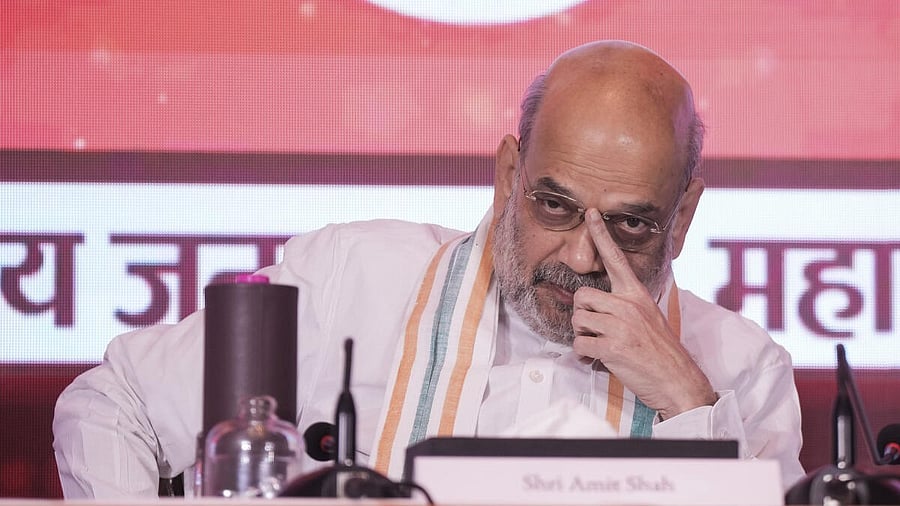
Union Minister and BJP leader Amit Shah
Credit: PTI Photo
Union Home Minister Amit Shah, it would seem, has not acquainted himself with the history of the Bastar Adivasis. If he had, he would have learnt that theirs is a history of struggles, protests, and rebellions - the most famous being the Bhumkal rebellion of 1910. In post-colonial Bastar, Bhumkal Divas is celebrated every year with great fanfare and renewed resolve to achieve what the Adivasis feel has been denied to them – sovereignty over their jal, jungle, and jameen (water, forest, and land). Not to forget that it is while fighting for their land and forests that those celebrated as Adivasi heroes today in independent India were hung from trees or killed by the British. The martyrs are not just part of the folklore but inspire present-day struggles against the corporate takeover of Adivasi land for the mining of precious minerals. A threat that is now in action mode.
So, the bottom line is that as long as there is a real or perceived threat to their resources the Adivasis will fight. While the Maoists hope to achieve a ‘revolution’ through armed means, it is not clear whether they would give sovereignty over local resources to the Adivasis if they were to come to power. But, in popular perception today, they are seen as protectors of Adivasi interests.
Successive central and state governments have favoured a ‘security-centric’ approach to combating the Maoists as opposed to securing the rights of Adivasis in Bastar by respecting all laws specific to governance in a Vth Schedule area. The Planning Commission group (of which the author was a part) that had been set up in 2006 (when Operation Salwa Judum raged in parts of Bastar) to study reasons of agrarian unrest had in its report Development Challenges in Extremist Affected Areas (2008) observed that the abysmal conditions of the labourers, rural poor and the working class were at the root of agrarian unrest and needed urgent redressal according to relevant laws that had remained unimplemented or applied half-heartedly; viewing and dealing with the unrest merely as ‘a law-and-order problem’ was a grave mistake. The report had warned against the ‘security-centric’ strategy maintaining that “[it] delegitimizes politics, dehumanizes people, degenerates those engaged in their ‘security’, and above all, represents the abdication of the state itself. It should be undone immediately….”. But the government chose to ignore the report’s recommendations and went ahead with its belligerent economic policies and militarization of tribal areas.
After Operation Salwa Judum, Bastar has seen many anti-Maoist operations including Operation Green Hunt that extended also to neighbouring Odisha and Jharkhand. The operations were all being carried out to meet a deadline “to wipe out the Maoists” by the powers that be at the time.
It is a good stretch of time for a well-meaning government to take a pause and assess the wisdom of its choice. Instead, a hawkish status quo has been maintained all along. Whether it be the ruling BJP or the preceding Congress, the narrative has been of “nation building” and “national interest” that necessitates ruthless counter-insurgency operations, never mind the Adivasi non-combatants who are getting killed in large numbers as collateral damage or in deliberate fake encounters. Never mind that in a hurry to accuse, rather than accurately ascertain political involvement, an entire people get enveloped in the same red blanket, many landing in prison and ending up spending long years as undertrials. Never mind that Adivasi activists of democratic movements are also being framed and jailed. Never mind that a powerful youth-led Adivasi democratic movement, the Moolvasi Bachao Manch, that was demanding transparency and accountability in public policy and action was declared illegal under the Chhattisgarh Special Public Security Act. Never mind that a significant number of personnel of the security forces operating in Bastar are committing suicide. Never mind that talk of having a political dialogue was just talk.
Law-abiding citizens are expected to swallow the narrative and trust that whatever is being done is in the public interest. But, is it?
Bela Bhatia
(The writer is based in Bastar, Chhattisgarh, and is a human rights lawyer. Her book ‘India’s Forgotten Country: A View from the Margins’ was published in 2024. The article reflects her personal views.)